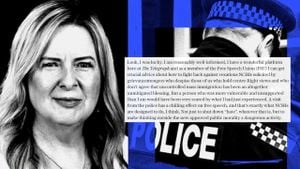Murray Sinclair, who passed away on November 4 at the age of 73, was not just any ordinary figure; he was one of Canada's most prominent advocates for Indigenous rights and justice. His death, which was confirmed by his family after battling illness for some time, marks the end of a remarkable chapter not only for Indigenous communities but for the entire nation. Sinclair's legacy is intertwined with the history and future of Indigenous relations in Canada, making him a monumental figure whose work will echo through time.
Born on January 24, 1951, Sinclair grew up during an era when Indigenous peoples lacked the right to vote. This childhood backdrop, deeply influenced by his family’s experiences with the residential school system, would fuel his lifelong passion for justice and equality. Sinclair was the first Indigenous judge of Manitoba and later ascended to the Senate, but his most impactful work came as the lead commissioner of the Truth and Reconciliation Commission of Canada (TRC), which operated from 2009 to 2015.
The TRC was established to confront the dark legacy of Canada's residential schools, where thousands of Indigenous children were forcibly removed from their families and cultures. Sinclair's leadership during the commission led to the collection of more than 6,500 testimonies from former students of these schools, who revealed harrowing stories of abuse, neglect, and cultural genocide. One of the commission's key findings was the alarming death count; more than 3,200 students reportedly died during their time at these institutions. Sinclair estimated this number could eventually top 10,000.
His dedication and tireless work resulted in the release of 94 ‘calls to action,’ which sought not only governmental reform but aimed to educate all Canadians about the injustices inflicted upon Indigenous peoples. “We needed individual Canadians to understand not only were Indigenous people mistreated throughout history, but you were lied to as well,” Sinclair stated, emphasizing the necessity for widespread public education on these historical truths.
Sinclair faced significant opposition from skeptics who doubted the existence of unmarked graves at former residential school sites. He steadfastly condemned such denial, attributing it to ignorance and a reluctance to confront uncomfortable truths. Despite this, he remained focused on the broader mission of reconciliation and justice, often reminding Canadians of their collective responsibility to rectify past wrongs.
His insights and guidance did not just transform individual cases—his work lifted the veil on systemic injustices. For many Indigenous people and their advocates, Sinclair became the voice and face of their struggles; he highlighted Indigenous issues to mainstream society and urged for substantial change.
Sinclair’s approach was innovative, steering away from traditional methods. Instead of confining testimonies to the commission's headquarters, he opted to travel across the country, ensuring those affected could share their stories where they felt safe. He leveraged technology, allowing for real-time sharing of experiences, showing his commitment to transparency. The TRC became more than just a series of hearings; it transformed public consciousness.
His recommendations called for comprehensive reforms, urging changes within health care, justice systems, and child welfare to address inequities faced by Indigenous peoples. Prime Minister Justin Trudeau declared the fulfillment of all 94 calls to action as his government’s priority, yet many remain unfulfilled or barely begun, reflecting the challenges of real change.
Sinclair's roots were deeply tied to the Land of the Anishinaabe people, where he developed his identity and connection to Indigenous culture. Following the death of his grandmother, who wanted him to become a Catholic priest, he pursued martial arts, sports, and eventually law, taking detours through community activism along the way. His rise through the judiciary was marked by systemic barriers—he often faced racism and bias, sometimes even being mistaken for the accused rather than the esteemed judge he was.
Before Murray Sinclair became the transformational figure we know today, he had nearly left law behind after years of frustration. It was only after speaking with Long Plain First Nation elder Angus Merrick—who encouraged him to embrace his knowledge and serve his community—that Sinclair found his calling. His dedication to advocacy brought forth transformative justice initiatives within Manitoba's court system which prioritized the experiences of Indigenous peoples.
After the TRC, Sinclair continued to influence Canadian thought as the chair of the Senate Committee on Aboriginal Peoples and remained vocal on the issues surrounding Indigenous rights. His passing has sparked reflections across Canada, with leaders mournfully recognizing his contribution to the fight for reconciliation.
Media outlets have praised his unwavering commitment and relentless work as they shared reflections from political figures, Indigenous leaders, and everyday Canadians who acknowledged how Sinclair's teachings interwove the fabric of Canadian society. His final work, the memoir “Who We Are,” published just weeks prior to his passing, encapsulates his philosophies and experiences, leaving behind insight and guidance for generations to come.
Although Sinclair’s life came to an end, his mission for justice persists, echoing through the corridors of policymaking and community advocacy. The call for truth and reconciliation continues, sustained by those who followed his legacy, keeping the dialogue on Indigenous rights relevant and urgent.
Moving forward, his story serves as both a reminder of the complex relations between Indigenous peoples and Canada and as motivation for future generations of activists to continue advocating for change. Murray Sinclair will always be remembered for his steadfast commitment to truth, justice, and reconciliation, making him an irreplaceable figure within the Canadian social fabric.



